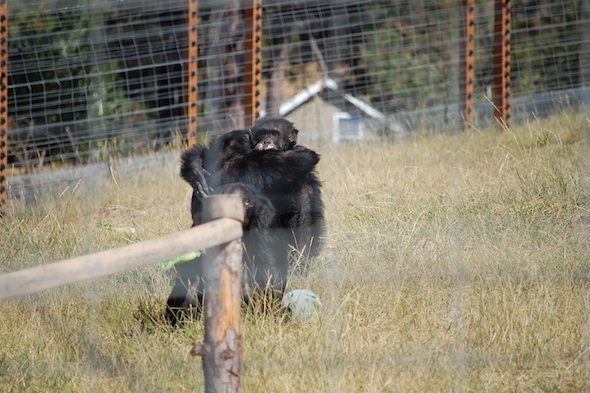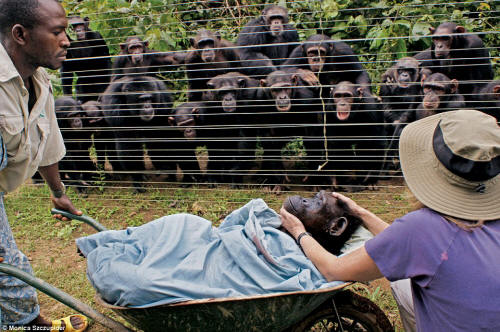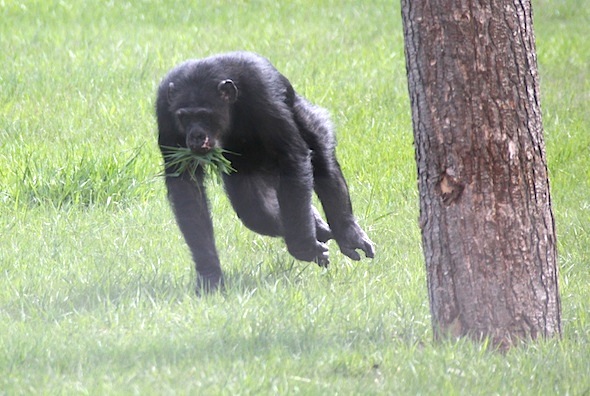The evidence in favor of protecting chimpanzees is overwhelming. We share over 98% of our DNA with them. Studies have shown that they have the capacity to create and use tools, to learn human languages, and to memorize and recall certain kinds of information faster and more accurately than college students. Field research has demonstrated that different communities have different cultures, that individuals form complex social alliances, and that they have the ability to hunt cooperatively.
But when I recite these facts, I feel like I am only telling part of the story. Taken individually, these abilities are fascinating, but to me they aren’t morally persuasive. Do chimpanzees really have to learn our language for them to deserve freedom from suffering? Do I really think that their ability to use tools is the reason why we shouldn’t lock them up and perform tests on them?
When you add them up, however, you start to understand that chimpanzees possess a remarkable richness and depth of experience. Yes, they are intelligent. Yes, they experience emotions. But the whole is even greater than the sum of its parts.
Over the years, I’ve thought about the moments that affected me most, the ones that deepened my understanding of chimpanzees and strengthened my resolve to help them, and they revolve around the two most fundamental experiences that we share with chimpanzees: life and death.
The first time I witnessed the death of a chimpanzee, Diana and I were working at the Fauna Foundation in Quebec, Canada. A chimpanzee named Pablo became suddenly ill, and before anything could be done to help him, he was gone. The story was detailed in a fantastic article by Joe D’Agnese in Discover Magazine. After Richard, the co-founder and veterinarian at Fauna, declared him dead, his body was laid on a blanket in one of the smaller rooms so that the other chimpanzees could come in and see him. I was not prepared for what came next. Over the next hour or so, we witnessed what I can only describe as a wake. Pablo’s family, the chimps that he had known through the hell of the lab and their eventual release to a wonderful and loving sanctuary, proceeded to come into his room, one or two at a time, and pay their respects. The older chimps seemed to accept his death and gently groomed his body for a while before moving on. The younger chimps, less experienced with death’s finality, tried to revive him, and when that didn’t work, they lashed out in anger.
Pablo’s death affected everyone at Fauna, and we all struggled to maintain our composure. As I headed down the hall, with tears running down my cheeks, I looked up to see someone waiting for me. Annie, the matriarch of the chimpanzees at Fauna, held her fingers out through the caging and offered a breathy pant of reassurance. After a lifetime of being told that humans were superior in all ways, I was being consoled by a loving, maternal chimpanzee, one who was much older and far wiser than me.
A few years ago, Monica Szczupider captured one of the most haunting photos that I have ever seen, one that speaks volumes about how chimpanzees deal with death. Following the death of Dorothy, a chimpanzee with strong ties to her family group at the Sanaga-Yong sanctuary in Cameroon, the staff wheeled her body to the fencing so that the other chimps could see her.
All cultures have their own way of dealing with death, but beneath the layers of ritual, our reactions are remarkably similar – the desire to spend one last moment with someone you love, and the need to hold those who are still with you even closer. In chimpanzees, we can see the root of this experience.
Many of the chimpanzees that we care for in sanctuaries lived for decades in laboratory cages. But they were alive only in the biological sense that their bodies continued to function. If your only knowledge of chimpanzees was of them living alone in small cages, you could be forgiven for thinking that there wasn’t much to their existence beyond eating, sleeping, and lashing out. What else could they do?
But at sanctuaries, we get to witness chimpanzees living for the first time. Not just being alive, but experiencing life, with all its ups and downs. I don’t think I will ever forgot the moment that we released the Cle Elum Seven onto Young’s Hill. They had been watching us build the enclosure for months, and by the end of the summer they were ready to walk out under the open sky for the first time. As soon as the door was opened, they rushed outside without hesitation. But before they ran off into the great outdoors, they stopped and hugged. They hugged out of fear. They hugged for joy. They hugged because they, like us, experience the world not just as individuals but as friends and as family members. Whatever it was that they were feeling, it was something that needed to be shared.

When we first met the chimps in the lab, we actually commented to each other that they didn’t seem as traumatized as we had expected, given their circumstances. But in hindsight, it was only because we didn’t know them yet. And maybe because they hadn’t had a chance to know themselves yet. The Missy that we met in that basement cell may have never had the opportunity to run before. But now, Missy is a running machine. She runs for no reason, in all directions, just to experience running. She lives to run.
I can’t say for sure that I know what it’s like to be a chimpanzee. In fact, I’m sure we can never really know. But just as we humans are more than what can be measured on IQ tests and SATs, there is far more to being a chimpanzee than we once thought.







Beautiful.
what a wonderful heartfelt article you have written J.B. I watched the Young Hill video when you first posted it and cried when I saw Annie and Burrito hugging. You and the other caretakers have built a wonderful sanctuary for these wonderful chimps.
Very beautiful story JB. You always write the best posts. It was a good post and part of it broke my heart. Thank you for the insight. Thank you also for rescuing the CE7, and giving them the best life they can now experience. 🙂
Awesome blog entry, J.B. I always learn something from you and like Ivy said, part of it broke my heart. I feel so honored to be part of the CE7’s existence and enjoy every minute I spend at CSNW.
Thank you. So sad and beautiful. But joyous too, because of people and places like CSNW….
Ive started this post many times but never can find words worthy of a response to that amazing post, much like now. I play that day 1 on the hill video on a regular basis for exactly the things you mention in your post. In addition to what that video says and doesn’t say about the CE7, from the little we get to know you from your posts, it does the same for you. I think the world is a better place because of you, the staff and volunteers at CSNW, and all of the others who struggle daily to make sanctuaries a place of hope, love, and home.
Hi JB,
You are a very accomplished writer. I had seen the photo of the group of Chimps at the fence when one of their members died. It is such a telling photo. And after reading The Chimps of Fauna one is very affected by the powerful story.
I really don’t think we should have compassion for the Chimps because they are so like us or because they are so intelligent but merely because they are beings on this earth. Even the insects crawling around do not deserve to be tortured. I’m not a Bible thumper but it says in the Bible that we have dominion over animals, which means we need to take care of them. That includes being as humane in all dealings with every animal that is possible. Keeping Chimps in cages and doing senseless experiments on them so that research scientists can keep their grants is just cruel.
Preaching to the choir:) Actually just wanted to tell you that you are an excellent writer and of course that you, Diana and the rest of the crew are so special!
W
I too am deeply appreciative of this posting J..B., and find myself mulling the insight you shared about chimps in lab cages being alive, at least biologically, and then truly experiencing life in a sanctuary setting where they can feel and sense life fully for the first time sometimes. Thank you, it was altogether, a very moving and insightful posting.
I am astonished how close chimpanzees are to us, even closer than I imagined. Nevertheless I sometimes think that there is a trend that apes – or animals in general – are being put on the same level as humans . I am not a very religious person, but I don`t think this is right. For example I was searching for monkeys in the internet and was shocked when wikipedia told me that the biggest monkey group are humans… Although I acknowledge the right for every animal to be kept in an appropiate way that meets its needs, I still think that humans have abilities and structures that set them apart from the animal kingdom. Not just some gradual improvement in evolution but reaching a new level of existence. It is kind of peculiar in my eyes: The more progress humanity makes: Landing on the moon, GPS, Internet and a thousand other things , the more people think that they are like animals. I don`t refer specifically to your contribution J.B., it is just my view on the topic.
Thanks for sharing your thoughts. You’re right that our views of apes and other animals have evolved over the years. I think there are two different issues at play here – our discovery of new facts about other animals, and changes in the way that we interpret and value those facts.
Within the field of science – the field that brought us the moon landing, GPS, and the internet – there is no controversy surrounding evolution and our taxonomic classification. Humans are primates. The primate order is generally broken down into three groups: prosimians, monkeys, and apes. We actually belong to the ape category, a classification that we share with chimpanzees, bonobos, gorillas, orangutans, gibbons, and siamangs.
Our understanding of our biological relationship with other animals has changed over the years as new facts have come to light. And through the research of people like Jane Goodall and many others, we have discovered that there are more behavioral similarities between us than we had ever imagined. The question is, what do we do with this knowledge? What does it mean in terms of how we should share the world with these cousins of ours?
I like humans, generally speaking. I don’t consider myself a misanthrope. And I don’t think elevating the status of other animals requires us to diminish our own status. We can still pat ourselves on the back for our technological and cultural achievements. But throughout history, every time we’ve drawn a sharp line between humans and other animals, science has erased it. Yet we continue to move the line. Maybe it’s time to accept that there is no line? To paraphrase Darwin – to accept that the differences between us are not differences in kind but of degree?
But we can easily start barking up the wrong tree here. To me, it comes back to which attributes are morally or ethically relevant. Why is it important not to cause someone to suffer? Why is it important to allow someone to live in accordance with their nature – to allow birds to fly, fish to swim, and Missy to run?
When I choose to be kind to another human being, it’s not because they are a member of a species that created the internet, as amazing as that may be. It’s because I, being a member of the same species, know what it’s like to want to live. I know what its like to feel pain. I know what it’s like to feel frustrated, to feel a sense of loss, to miss my family. And I wouldn’t want to cause anyone to feel these things if I could help it.
The more we learn about other animals, the more we discover that they share these feelings too. If they are so biologically and behaviorally similar to us, maybe I do, in some small sense, know what it’s like to feel as they do.
Thank you for answering and explaining your point of view. For me there is still a sharp line between humans and apes/animals, but this is just my opinion.. I refer to being able to see what “good” and “bad”, “right” or “wrong” is, being able to be an observer , not just an instinct -driven participant of life , creation of art etc.. It would lead to far to go into details. I sometimes wonder what animals are thinking and how they experience things. But even among humans there are big differences and one really never knows.
Keep up the good work,by the way.
Wonderfully heartwarming and beautifully written!